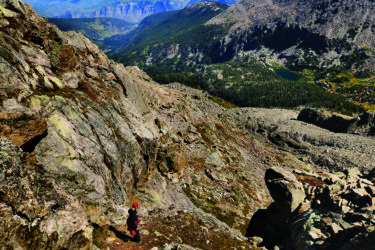The Local newsletter is your free, daily guide to life in Colorado. For locals, by locals.
Coloradans are some of the biggest nature fanatics on the planet, but take away our REI and Patagonia gear, and we’d probably think twice about that fourteener. Ben Jenkins and Aaron Klass are planning to do just that, but they aren’t abandoning their gear—they’re turning back the clock. Both men will use equipment, food, and clothing from the 1860s to hike 521 miles on the Colorado Trail, from Denver to Durango, starting Saturday, July 6.
It was Jenkins who first conceptualized the Colorado Trail endeavor, after attempting to hike the trail with modern equipment in 2014. He injured his leg a few miles in, and during his recovery period at home, rediscovered a passion for “living history,” more commonly known as reenacting of historical events or time periods. “We were at a thrift store and I found this old, wide straw hat. I bought it, put it on eBay, and it sold,” said Jenkins. That spawned a new business and eventually the idea for the hike.

Jenkins has only known Klass for a few years, but they became fast friends after meeting in the living history community. When the question of a companion came up, Jenkins immediately turned to Klass as his choice. Together, they began planning their excursion.
The biggest theme of the trip is to keep every detail as accurate as possible to 1860. “It’s going to be unique even in the living history world just because we’re going to be able to achieve the amount of immersion we’re going for,” Klass says.
Though the trail itself is well marked, Jenkins and Klass will be taking a few liberties: they will have a modern data book, with important information like water sources and less intuitive sections of trail, and a compass from the 1850s.
Their only other deviation relates to food. “Ninety percent of our menu is documented in Colorado between 1859 and 1861, but the other 10 percent or so is going to be stuff that we’ll rely on to keep going,” says Klass. Remarkably, those modern equivalents are still based on recorded 19th century snacks. A similar rule applies with all other aids; for example, they’ll refuel in Breckenridge, which was established in 1859 and therefore would have existed in 1860.
The fickle Colorado weather will be a big determining factor in how the trip goes. Fortunately, Jenkins and Klass will be able to wear warm woolen clothing as well as rubberized ponchos to fend off some of the summer storms.
Other than weather, Jenkins cites the isolation of a month-long trip as a concern, although he and Klass are looking forward to experiencing nature in its entirety. “It’s going to give us a profound appreciation for these early settler types,” Klass says.
A two-man documentary crew will be tailing the duo as they hike, but they’ll be in a fly-on-the-wall capacity, only breaking in to do interviews. Eventually, they hope to enter it in festivals like Sundance with the goal of showing audiences a true escape from modern times. “I’m hoping to be a better person when I get back,” Jenkins says, “and I’ll be able to remind myself that I don’t need [modern] stuff to be happy.”
Visit their GoFundMe at www.gofundme.com/500miles1860.








